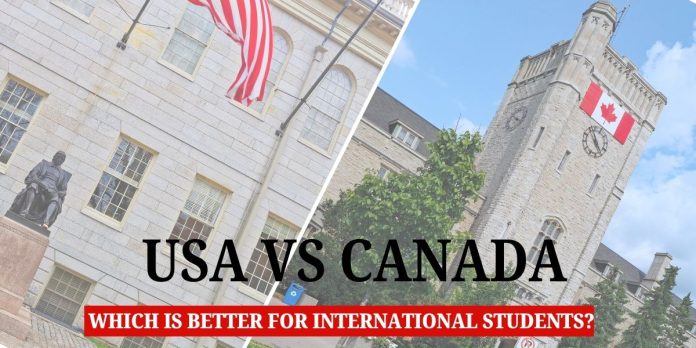CAMPUS REPORTS
Study in USA vs Canada: Which is Better for International Students?

Choosing where to study abroad is a big decision, and with so many great options out there, you want to be sure you are making the right one. The USA and Canada are both top choices for international students, thanks to their world-class universities and high-quality education.
But when you take a closer look, there are some key differences, especially in areas like tuition fees, cost of living, and visa policies. Many international students are naturally drawn to the USA for its prestige and wide range of programs, and Canada is just as appealing, especially with its simpler immigration rules and student-friendly environment.
However, when it comes to post-graduation opportunities, quality of life, and living expenses, Canada and the USA offer very different experiences. Understanding these differences can help you choose the country that best fits your goals and lifestyle.
In this comparison guide, we will break down the key factors to consider when studying in the USA vs Canada: which is better for international students.
From tuition fees and living expenses to academic reputation and post-study opportunities, you will get a clear picture of what to expect from each destination, so you can choose the one that fits your goals and budget best.
USA vs Canada: Academic Excellence and Reputation
United States(USA):
The U.S. has some of the most prestigious universities in the world, all leading in research, innovation, and academic depth. And another great thing about the United States is that you will find out that most courses have a flexible structure.
American universities are big on research, critical thinking, and cross-disciplinary learning. U.S. schools consistently dominate global rankings.
In the 2025 U.S. News & World Report, Harvard University, Massachusetts Institute of Technology (MIT), and Stanford University were all in the top 10 globally, so you can consider the US if you want global recognition and career growth.
Canada:
Canadian universities may not be as popular as the US, but it is home to some of the world’s best universities, like the University of Toronto, the University of British Columbia(UBC), and McGill University, which are all ranked in the global top 50 by QS and Times Higher Education.
Canadian education is designed to prepare you for the real world, with a strong focus on research, hands-on learning, and global perspectives. Additionally, Canada is attracting more and more international students, who made up over 21% of the student population in 2023.
Admission Criteria & Requirements to Study in USA vs Canada
If you are eligible to study in one of the countries, there’s a high chance of you qualifying for the other. Both the USA and Canada have similar academic standards, but they differ in things like standardized tests, proof of funds, and visa processes.
While each university sets its own specific admission criteria, most follow a general structure. Here’s a breakdown of the typical requirements for undergraduate and postgraduate studies in both countries:
Requirements to Study in the USA :
- Academic Transcripts: You must submit your WAEC/NECO results (for undergraduate) or university transcripts (for postgraduate). Also, Transcripts should be evaluated using WES or ECE if requested by the school.
- English Language Proficiency: Unless you are exempted with WAEC English (some US schools allow this), you will need: IELTS: Minimum 6.0 – 6 and TOEFL: Minimum 80 – 100 iBT. Some universities waive this if your previous education was in English.
- Standardized Test Scores: Many top schools require the SAT with a minimum of 1050 or the ACT with a minimum score of 18 for undergraduate admission. While for postgraduates, some courses require a GRE score of 300 or a GMAT score minimum score of 500
- Statement of Purpose (SOP) or Personal Essay: This is a detailed essay about your academic journey, goals, and why you are choosing that program and university.
- Academic CV/Resume: Especially for graduate programs (MBA, MS), you will need a detailed CV.
- Letters of Recommendation: You will need to submit 2-3 letters, usually from professors or employers who can vouch for your abilities and character.
- Proof of Funds: You must submit a bank statement or sponsor letter showing you can cover: Tuition + at least $10,000–$15,000 (USD) for living costs.
- F-1 Student Visa (USA): Once you receive your I-20 form from the university, apply for your F-1 visa at the U.S. embassy. You will need to:
- Pay your SEVIS fee
- Schedule and attend a visa interview
- Present your I-20, passport, and proof of funds
Requirements to Study in Canada:
- Academic Transcripts: You must provide your WAEC/NECO results (for undergraduate programs) or university transcripts (for postgraduate programs). If the transcript is not in English or French, it must be translated.
- English Language Proficiency: Most universities require proof of English through IELTS or TOEFL. IELTS: Minimum 6.0 – 6.5 overall, TOEFL: Minimum 80 – 90 iBT. Some schools accept WAEC English (C6 and above) in place of IELTS, especially for Nigerian students.
- Standardized Test Scores: For undergraduates, the SAT/ACT is usually not required for most universities in Canada, and for postgraduate students, the GRE/GMAT is not commonly required, except for top MBA programs. If needed, a minimum score of 550 for GMAT and 300 for GRE.
- Statement of Purpose (SOP) or Motivation Letter: You will need to explain why you chose the course and university, and how it aligns with your career goals.
- Academic CV/Resume: For postgraduate studies (especially MBA or professional programs), a well-written CV is required. At least 1–2 years of relevant work experience is an advantage.
- Letters of Recommendation: Most Canadian universities require 2–3 letters from former lecturers, employers, or supervisors. These should speak about your academic ability or work ethic.
- Proof of Funds: You must show a bank statement or financial proof that you can support yourself during your stay. As of 2025, you need to show at least $20,635 (living costs) + first-year tuition.
- Canadian Study Permit (Student Visa): Apply for your visa through the Student Direct Stream (SDS) or regular visa route. You will need:
- Letter of admission
- Proof of funds
- Valid passport
- Medical exam & biometrics
USA vs Canada: Cost of Studying and Living
Generally, Canada is more affordable than the USA when it comes to both tuition and living expenses. But there are important differences depending on where you study, what you study, and how you live.
While both countries offer high-quality education, the cost of your degree will vary greatly. U.S. tuition fees are usually higher, but they also offer more financial aid options. Canada, on the other hand, has lower average costs but fewer scholarships and job opportunities in some provinces.
Tuition Fees in the USA:
Tuition in the U.S. can be expensive, especially at private universities. On average, international students pay $20,000 to $60,000 per year for postgraduate programs, with some top schools even higher.
Even public universities can cost up to $50,000 per year, depending on the program and location. However, thankfully, U.S. schools offer scholarships, assistantships, and part-time jobs to help ease the burden.
Tuition Fee in Canada:
Tuition fees in Canada are more affordable. Undergraduate tuition ranges from $15,000 to $35,000 per year, while graduate programs cost around $20,000 to $40,000+. Some top universities may charge more, but it is still lower than many U.S. options.
However, it is important to note that international students still pay much more than domestic students, about five times more, so budgeting is still important.
Cost of Living in the USA:
Living expenses in the U.S. vary wildly depending on the city. For instance, rent in New York City averages $4,550/month, while a place in Baton Rouge, Louisiana, costs around $1,150/month.
In the United States, big cities come with higher costs for food, transport, and housing, but also offer more job opportunities. On average, expect to spend $1,500 to $3,000 per month on living costs in the U.S., depending on your lifestyle and location.
Cost of Living in Canada:
Canada is generally more affordable than the U.S., especially in smaller cities. Even in Toronto, the most expensive Canadian city, student housing averages around $2,478/month, which is still cheaper than many U.S. metro areas.
In cities like Ottawa or Calgary, students spend closer to $2,000/month on rent and living expenses. Groceries, transportation, and healthcare are also more affordable than in the U.S.
If you are on a student budget, Canada gives you a better shot at balancing your costs without compromising on comfort or quality of life.
Discover more from Asiwaju Media
Subscribe to get the latest posts sent to your email.
-

 EDITORIAL4 days ago
EDITORIAL4 days agoThe Life and Legacy of Muhammadu Buhari (1942–2025)
-

 NEWS6 days ago
NEWS6 days agoFoundation Conducts Outreach in Amaenyima, Settles Hospital Bills and Support
-

 FACT-CHECKS/INVESTIGATION6 days ago
FACT-CHECKS/INVESTIGATION6 days agoHow Federal Lawmaker, Ogah Snatches Village Land in Ebonyi
-

 ENTERTAINMENT3 days ago
ENTERTAINMENT3 days agoAzealia Banks Accuses Conor McGregor of Sending Unsolicited Explicit Images
-

 NEWS5 days ago
NEWS5 days agoNicki Minaj Buys $25 Million Pink-Themed Private Jet, Sparks Celebration Online
-

 OPPORTUNITIES4 days ago
OPPORTUNITIES4 days agoHow to apply for 2025 civil defence, immigration, corrections, fire service jobs
-

 NEWS6 days ago
NEWS6 days agoDeji Adeyanju Rewards Top Law School Graduates With N8m Cash Gift
-

 NEWS4 days ago
NEWS4 days agoBREAKING: Former President Muhammadu Buhari Reportedly Dies in London Clinic at 82
-

 NEWS2 days ago
NEWS2 days agoNigerians Lament Frustration Over CDCFIB Recruitment Portal Failures
-

 POLITICS4 days ago
POLITICS4 days agoSowore Alleges Buhari Died of Blood Cancer, UK Treatment Cost Nigeria £3,000 Per Night
-

 EDITORIAL2 days ago
EDITORIAL2 days agoWhen Recruitment Becomes Frustration—How CDCFIB’s Portal is Failing Nigerians
-

 NEWS6 days ago
NEWS6 days agoNigerian Socialite Abiola Femi Quadri Jailed in U.S. for $1.3M COVID-19 Fraud Scheme






































